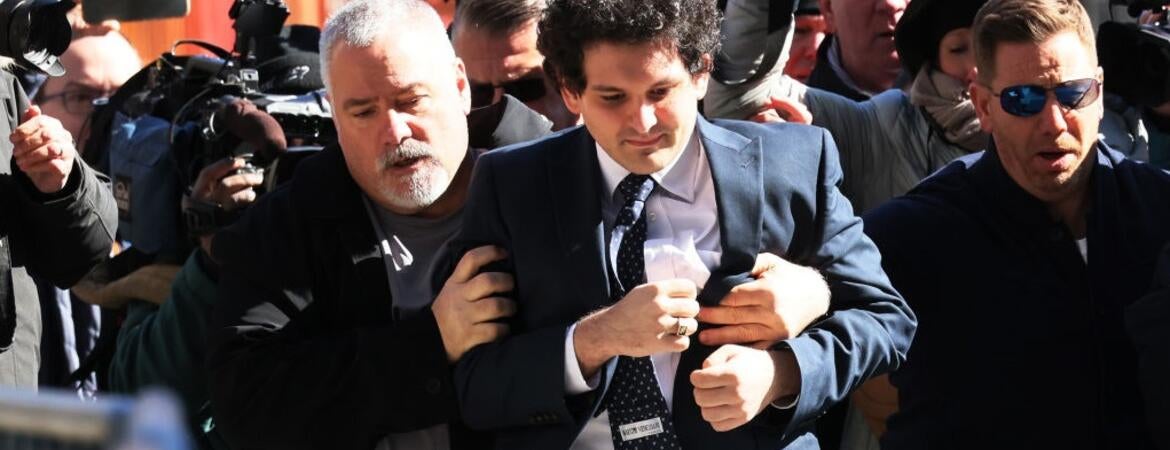
Sam Bankman-Fried (aka, S.B.F.), is a cryptocurrency CEO convicted of duping more than a million investors. John Martin Fischer is a UC Riverside philosophy professor who is a world-leading expert on free will and moral responsibility. Fischer's ruminations on near-death experiences have been consumed by millions in his writings and on YouTube videos. In this essay, he refutes the theory held by many – including Sam Bankman-Fried’s mother – that we live our lives within the confines of determinism.
Following is an essay John Martin Fischer has written for UCR News:
Robert Sapolsky argues in his much-ballyhooed book, “Determined: A Science of Life Without Free Will,” that all human behavior is the result of determinism, the doctrine that all our choices and actions are the result of causal influences that fully explain them, and that stretch back to events wholly out of our control. He concludes we have no moral responsibility; no one deserves moral blame or punishment, moral praise or gratitude. Sapolsky is a famous neuroscientist and polymath—a professor at Stanford who has been awarded a MacArthur Foundation “genius award.”
The denial of free will and moral responsibility is certainly not a new view. Baron d’Holbach, the 18th century German philosopher, held exactly these views. Friedrich Nietzsche, another German philosopher, arguably held them as well, or something very similar, in the 19th century. In his influential 1971 book, “Beyond Freedom and Dignity,” American psychologist B.F. Skinner followed suit, emphasizing what he took to be the negative effects of adhering to the illusions of freedom and moral responsibility, which he took to be anachronistic ideas incompatible with science. For Skinner, all our behavior can ultimately be described in terms of stimulus and response, behavioral conditioning, and so forth; he was a pioneer in developing “behaviorism,” which eschews attributions of inner mental states, including those that would underwrite human free will. He thought it was a more humane and enlightened way of viewing human behavior.
Fast forward to the contemporary philosophical and, more broadly, legal and even scientific scene, and you see the same views in new, more stylish and up-to-date clothes. Many philosophers (and some legal theorists) are developing arguments, increasingly influential (but still definitely in the minority), to the effect that we are not free or morally responsible. Strikingly, many neuroscientists, with their newly developed ways of studying the brain, are staking out a version of this moral responsibility skepticism. As scientists, they command the attention and respect of many.
Enter Robert Sapolsky, B.F. Skinner on steroids (or, better, neurobiology). He is indisputably a distinguished scientist, who has previously written enlightening books on primate behavior, explaining (for instance) why “zebras don’t have ulcers.” Reading his latest book, however, I feel I am developing ulcers! I have studied the difficult and complex issues of free will and moral responsibility my entire career, and I simply do not agree that all our behavior is caused in such a way as to rule out moral responsibility. This certainly is a shocking and disturbing conclusion, which would require radical changes in the way we view ourselves as moral agents fundamentally different from animals, even higher primates, and certainly zebras.
Despite the many pages of illuminating discussions of the various factors that go into explaining our choices and actions—genetics, epigenetics, early experiences with our care-givers, experiences and relationships throughout our lives in our socio-economic niches, and perhaps most importantly, our neurobiology—I do not believe he establishes that we are determined in a way that eliminates free will. I am not a neuroscientist, or any sort of scientist, but I observe that many neuroscientists deny that the brain works in a deterministic manner. As just one example, a recent book, which arrived in my mailbox on the same day as Sapolsky’s, is written by Kevin Mitchell, a neuroscientist and geneticist at Trinity College Dublin. Its title is “Free Agents: How Evolution Gave Us Free Will.”
I cannot here go into detail about why I disagree with many of Sapolsky’s conclusions, but I wish to highlight what might be called his “Trading Places Argument” (with apologies to Eddie Murphy). He writes:
Imagine a university graduation ceremony. Almost always moving… The happiness, the pride. The families whose sacrifices now all seem worth it. …
And then you notice someone. Amid the family clusters post-ceremony… you see the person way in the back, the person who is part of the grounds crew, collecting the garbage from the cans on the perimeter of the event.
Randomly pick any of the graduates. Do some magic so that this garbage collector started life with the graduate’s genes. Likewise for getting the womb in which 9 months were spent and the lifelong epigenetic consequences of that. Get the graduate’s childhood as well—one filled with, say, piano lessons and family game nights, instead of, say, threats of going to bed hungry, becoming homeless, or being deported for lack of papers. Let’s [suppose] that, in addition to the garbage collector having gotten all that of the graduate’s past, the graduate would have gotten the garbage collector’s past. Trade every factor over which they had no control, and you will switch who would in the graduation robe and who would be hauling garbage cans. (16-17)
Note that another moral responsibility denier, Barbara Fried (also of Stanford, now emerita in the Stanford Law School) holds a similar view, according to which almost all of what we become is an inevitable result of our parents’ level of education and socio/economic status.
But her infamous son, Sam Bankman-Fried, didn’t appear to have any of the relevant deficits. His parents were both professors at Stanford Law School, and he grew up in a lovely house on the Stanford campus, not wanting for money. In Sapolsky’s framework, I doubt that Sam ever went to bed hungry or worried about homelessness.Perhaps there weren’t Friday night game nights, but there were indeed Sunday afternoon “salons” at which his parents (and, presumably, at some point Sam) discussed politics and their commitment to progressive causes. There certainly can be causation by osmosis, especially in the parent/child relationship (although there is rebellion as well). Often the acorn doesn’t fall too far from the tree.
Sam Bankman-Fried became a convicted criminal, someone who hurt and devastated many people, sometimes depriving them of their lifesavings. (As I write this, he has been convicted of seven counts of fraud, with a maximum sentence of 110 years.) He is the Crypto Bernie Madoff.
This doesn’t fit the Sapolsky/Fried paradigm. Neither do any of a huge number of persons who rise above their parents, their early childhood experiences (including serious physical and psychological abuse), socio-economic status, and so forth to excel in so many facets of life—both in their careers and personal lives. I know, and you know, and even Sapolsky and Fried know people whose formative factors were like the garbage collector’s but ended up the graduate (metaphorically speaking).
It is such a beautiful thing to see, a beauty entirely absent from the drab no-responsibility world of Sapolsky (and the skeptics). I once attended a graduation ceremony at Stanford University (although not as a professor). Many of my friends in my graduating class were scions of rich and famous people. Not me. But I did as well as any of them, and there were others like me. I’m sure many had challenges much larger than mine, and the parents of some of them might have been custodians, struggling with poverty (not solely caused by the Stanford tuition!), and racism and other forms of social injustice and hatred.
Most years I am part of the procession of faculty to the stage of our UC Riverside commencement ceremonies. One year I gave the commencement address for the CHASS ceremony. When I look out at the smiling faces of so many of the graduating seniors and their thrilled families, I know the joy comes in part from the fact that the students are the first in their families to go to college. Their families have struggled to send them to the University of California, and they are so very proud.
One of my very favorite undergraduate students at UCR came from a family of agricultural workers and went off to a top law school. She was brilliant, worked hard, and succeeded spectacularly, and yet I’m guessing she had none of the advantages of Sam Bankman-Fried. She and and so many others refute the Trading Places Argument.



